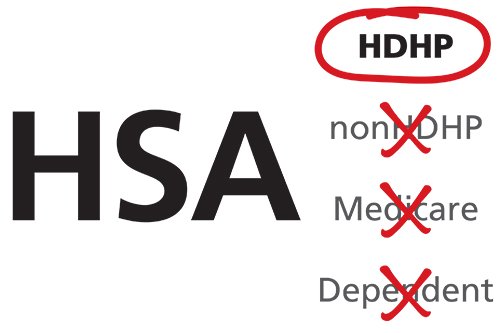Maximizing The Benefits Of A Health Savings Accounts (HSA)
A Health Savings Account (HSA) is a tax-advantaged savings account designed to help individuals manage their healthcare expenses. It is available to individuals who are covered by a high-deductible health plan (HDHP). HSAs offer several advantages, including tax benefits, flexibility, and the potential for long-term growth.
Author:Luqman JacksonReviewer:Liam EvansJul 18, 202321K Shares344.8K Views

A Health Savings Account(HSA) is a tax-advantaged savings account designed to help individuals manage their healthcare expenses. It is available to individuals who are covered by a high-deductible health plan (HDHP). HSAs offer several advantages, including tax benefits, flexibility, and the potential for long-term growth.
To be eligible for an HSA, individuals must meet specific criteria set by the Internal Revenue Service (IRS). They must have a qualified HDHP, have no other health coverage, not be enrolled in Medicare, and not be claimed as a dependent on someone else's tax return.
Eligibility And Beneficiaries Of An HSA
To qualify for an HSA, individuals must have a qualified HDHP and meet the eligibility standards set by the IRS. An eligible individual is someone who has a qualified HDHP, has no other health coverage, is not enrolled in Medicare, and is not claimed as a dependent on someone else's tax return.
The maximum contribution limits for an HSA in 2022 are $3,650 for an individual and $7,300 for a family. Individuals aged 55 or older can make catch-up contributions of an additional $1,000.
HSAs are individual accounts owned by the account holder. However, beneficiaries can be designated to ensure that the funds can be transferred to a spouse or qualified beneficiary in the event of the account holder's death.
Reimbursement And Documentation Requirements
When utilizing funds from an HSA for qualified medical expenses, it is vital to maintain proper documentation. This entails keeping thorough records, such as receipts and explanations of benefits (EOBs), to substantiate the withdrawals made from the HSA. The significance of maintaining proper documentation cannot be overstated, especially in the event of an audit by the IRS.
HDHPs And HSA Suitability
Assessing the suitability of an HDHP and HSA combination involves comparing premiums and deductibles with those of other health insurance plans. HDHPs offer distinctive tax advantages, including the opportunity to contribute to an HSA. It is crucial to consider your individual healthcare needs, risk tolerance, and the offerings provided by your employer when determining whether an HDHP and HSA are suitable for your specific circumstances.

What is a Health Savings Account? HSA Explained for Dummies
Uses Of An HSA
HSAs can be used for various eligible healthcare expenses beyond co-pays and deductibles. Some examples include:
- Prescription medications
- Dental and vision care
- Mental health services
- Alternative therapies
Additionally, HSAs can be used to pay for health insurance premiums in certain situations, such as continuation coverage (COBRA) or long-term care insurance premiums. However, specific rules and guidelines apply to these types of expenses.
HSA As A Retirement Account
HSAs can serve as a valuable tool for retirement savings. Unlike flexible spending accounts (FSAs), HSAs have no use-it-or-lose-it provision, allowing the funds to roll over from year to year. This makes HSAs a powerful vehicle for saving and investing for healthcare expenses in retirement.
However, it's important to note that there are penalty and tax implications for early withdrawals from an HSA for non-qualified medical expenses before age 65. Such withdrawals are subject to income taxes and an additional 20% penalty. After age 65, withdrawals can be made for any reason without incurring the penalty, although income taxes may still apply for non-medical expenses.
Examples Of Qualified Medical Expenses
HSAs can be used to pay for various qualified medical expenses. Examples include:
- Health plan co-payments
- Dental work and orthodontia
- Eyeglasses and contact lenses
- Prescriptions
- Massages and yoga classes with a medical necessity letter from a doctor
- Over-the-counter medications and feminine hygiene products (eligible under the CARES Act)
- Mileage to a doctor or medical facility
- Lodging for medical care in another city that requires an overnight stay
- Post-tax COBRA and long-term care policy premiums
It's important to consult the IRS guidelines and regulations for a comprehensive list of qualified medical expenses.
Pros And Cons Of Health Savings Accounts

The Real TRUTH About An HSA - Health Savings Account Insane Benefits
Health Savings Accounts (HSAs) offer individuals a unique approach to managing healthcare expenses and saving for the future. Like any financial tool, HSAs come with their own set of advantages and disadvantages. Let's explore the pros and cons of Health Savings Accounts to help you make an informed decision about whether an HSA is the right choice for you.
Advantages Of A Health Savings Account
There are several advantages to opening a health savings account:
Tax Benefits
HSAs provide significant tax advantages compared to 401(k) accounts. Contributions made through paycheck deduction are pre-tax, reducing taxable income. Contributions from employers, relatives, or others are also tax-free. Withdrawals for qualified medical expenses are not taxable. Additionally, contributions to an HSA can be made even if not working and can be deducted on your federal tax return.
No Opening Deposit
Opening an HSA account typically does not require a minimum deposit, making it accessible for individuals with varying financial situations.
Balance Rolls Over
Unlike flexible spending accounts (FSAs), HSA balances roll over from year to year. There is no time limit for spending the funds, allowing for accumulation and saving for future healthcare needs.
Investment Opportunities
HSAs offer investment options, including stocks, bonds, and other instruments. Earnings from investments within the HSA are tax-free. However, some trustees may have minimum balance requirements and limited investment options.
Portability
HSAs are portable, meaning you own the account, not your employer. If you change jobs, you can take the HSA with you and continue using it for medical expenses.
Insurance-Eligible
HSAs held in federally insured banks and credit unions are insured up to $250,000, providing peace of mind and protection for your funds.
Benefits to Family
HSA funds can be used to cover qualified medical expenses for your spouse and dependent children, even if they are not covered under your HDHP. This flexibility allows you to support your family's healthcare needs.
Offset Medicare Premiums
After retirement, HSA funds can be used to pay for Medicare or Medicare Advantage plan premiums, providing additional financial support for healthcare expenses in retirement.
Easy Transfers
HSA funds invested in mutual funds or stocks can be easily transferred to pay for approved medical expenses as needed, offering convenient coverage for healthcare costs.
Disadvantages Of A Health Savings Account
It's important to consider the potential disadvantages of using a health savings account:
Potential Tax Drawbacks
Withdrawals from an HSA for non-medical expenses before age 65 are considered taxable income and subject to a 20% penalty. Proper usage of HSA funds for qualified medical expenses is crucial. Keeping receipts and documentation is important, as expenses paid with HSA funds may be subject to audits.
Limited Eligibility
If claimed as a dependent on someone else's tax return, you are ineligible for an HSA. Only individuals with high-deductible health plans qualify, which may limit eligibility for some individuals.
Rejection of HSA Cards
Not all stores accept HSA debit cards, requiring out-of-pocket payments with subsequent reimbursement from the HSA trustee. Keeping records and submitting claims for reimbursement is necessary in such cases.
Weak Earnings and Investment Limits
HSA accounts may offer low-interest rates, and some trustees impose monthly fees for balances below a certain threshold. Minimum balance requirements may exist before investing, and investment options can be limited. Investments within HSAs are not insured.
No More Contributions After Age 65
Once an individual reaches age 65, no additional contributions, including catch-up contributions, can be made to an HSA, even if still employed. However, existing funds can still be used for qualified medical expenses.
Is An HSA Right For You?
Deciding whether an HSA is right for you depends on your personal circumstances and financial goals. Consider the following factors:
- Do you have a qualifying high-deductible health plan (HDHP)?
- Can you afford the high deductibles associated with an HDHP?
- Are you looking for tax advantages and long-term growth potential for healthcare savings?
- Do you want flexibility in using the funds for qualified medical expenses?
- Are you comfortable with the potential tax implications and limitations of an HSA?
Comparing HSAs to other healthcare savings options, such as flexible spending accounts (FSAs), can also help you make an informed decision based on your specific needs and preferences.
Significant Considerations For HSA Usage
Here are a few more considerations to keep in mind:
- Importance of Health Insurance Considerations - While HSAs offer significant tax advantages, it is essential to evaluate the overall health insurance coverage and consider factors such as network providers, coverage limits, and out-of-pocket costs. Make sure the HDHP fits your healthcare needs and budget before committing to an HSA.
- State-Specific Tax Treatment of HSAs -It is important to understand the state-specific tax treatment of HSAs. States like California and New Jersey have their own rules and regulations regarding the tax treatment of HSAs. Be aware of any additional taxes or reporting requirements imposed by your state.
- Seeking Professional Advice - Given the complex nature of HSAs and their interaction with taxes and healthcare, it is wise to consult with a financial advisor or tax professional. They can provide personalized guidance based on your specific situation and help you make informed decisions regarding your HSA contributions, investments, and withdrawals.
By carefully considering these additional factors and seeking professional advice when needed, individuals can make the most of their HSAs and enjoy the financial advantages they offer while effectively managing their healthcare expenses.
Common Questions About Health Savings Accounts (HSAs)
Health Savings Accounts (HSAs) provide individuals with flexibility and tax advantages when it comes to managing their healthcare expenses. Here are some common questions about HSAs and their answers:
Can I Open An HSA If I'm Self-employed?
Yes, individuals who are self-employed and have high-deductible health plans (HDHPs) can open an HSA. It is important to research and choose the best HSA provider, such as Fidelity, HealthEquity, or Lively, to suit your specific needs.
Do I Have To Utilize All Of My HSA Funds Every Year?
No, unlike Flexible Spending Accounts (FSAs), HSA contributions can roll over from year to year. This allows for the accumulation of funds and potential growth, providing the flexibility to save for future medical needs or even invest the funds for retirement purposes.
Can I Use My HSA Funds To Pay For Insurance Premiums?
In most cases, HSA funds cannot be used to pay for insurance premiums. However, there are exceptions. HSA funds can be used to cover Medicare premiums or other healthcare continuation coverage, such as COBRA, while receiving unemployment compensation. Long-term care insurance premiums may also be paid using HSA funds.
People Also Ask
Can I Withdraw HSA Money?
Yes, you can withdraw HSA funds tax-free and without penalty if used for qualified medical expenses. However, non-qualified withdrawals will be subject to income taxes and a 20% tax penalty.
Can I Transfer Money From HSA To Bank Account?
Yes, you can transfer funds from your HSA to your personal checking or savings account through online transfers. This allows you to reimburse yourself for out-of-pocket expenses.
Can I Buy Apple Watch With HSA?
According to the IRS, expenses for fitness trackers, such as an Apple Watch, are not considered eligible expenses under an HSA. This is because they are categorized as promoting "general health" rather than directly related to medical treatments or conditions. Therefore, purchasing an Apple Watch with HSA funds would not be allowed.
Conclusion
Health savings accounts (HSAs) offer individuals a tax-advantaged way to save for healthcare expenses. They provide flexibility, tax benefits, and potential long-term growth. By understanding the eligibility requirements, tax advantages, and strategies for maximizing HSA benefits, individuals can make informed decisions about their healthcare savings.
When considering an HSA, it's essential to assess your eligibility, evaluate the suitability of an HDHP, and determine how you can best leverage the tax advantages and investment opportunities provided by an HSA. Additionally, keeping proper documentation and understanding qualified medical expenses will help you effectively utilize your HSA funds.
HSAs can play a valuable role in your financial plan, providing a dedicated savings vehicle for healthcare expenses and potentially serving as a retirement account. Consider consulting with a financial advisor or tax professional to determine the best approach for incorporating an HSA into your overall financial strategy.
Remember, everyone's healthcare and financial situations are unique, so it's important to evaluate your specific circumstances and seek professional advice when making decisions related to HSAs and healthcare savings.
Jump to
Eligibility And Beneficiaries Of An HSA
Reimbursement And Documentation Requirements
HDHPs And HSA Suitability
Uses Of An HSA
HSA As A Retirement Account
Examples Of Qualified Medical Expenses
Pros And Cons Of Health Savings Accounts
Is An HSA Right For You?
Significant Considerations For HSA Usage
Common Questions About Health Savings Accounts (HSAs)
People Also Ask
Conclusion

Luqman Jackson
Author

Liam Evans
Reviewer
Latest Articles
Popular Articles

